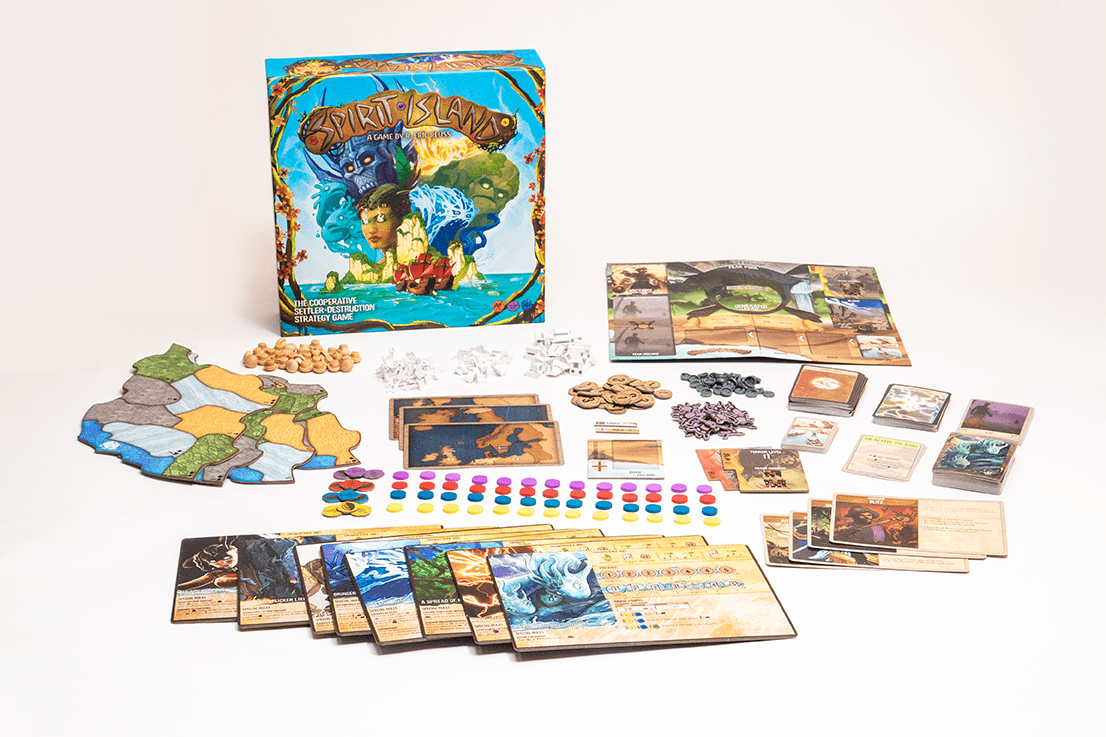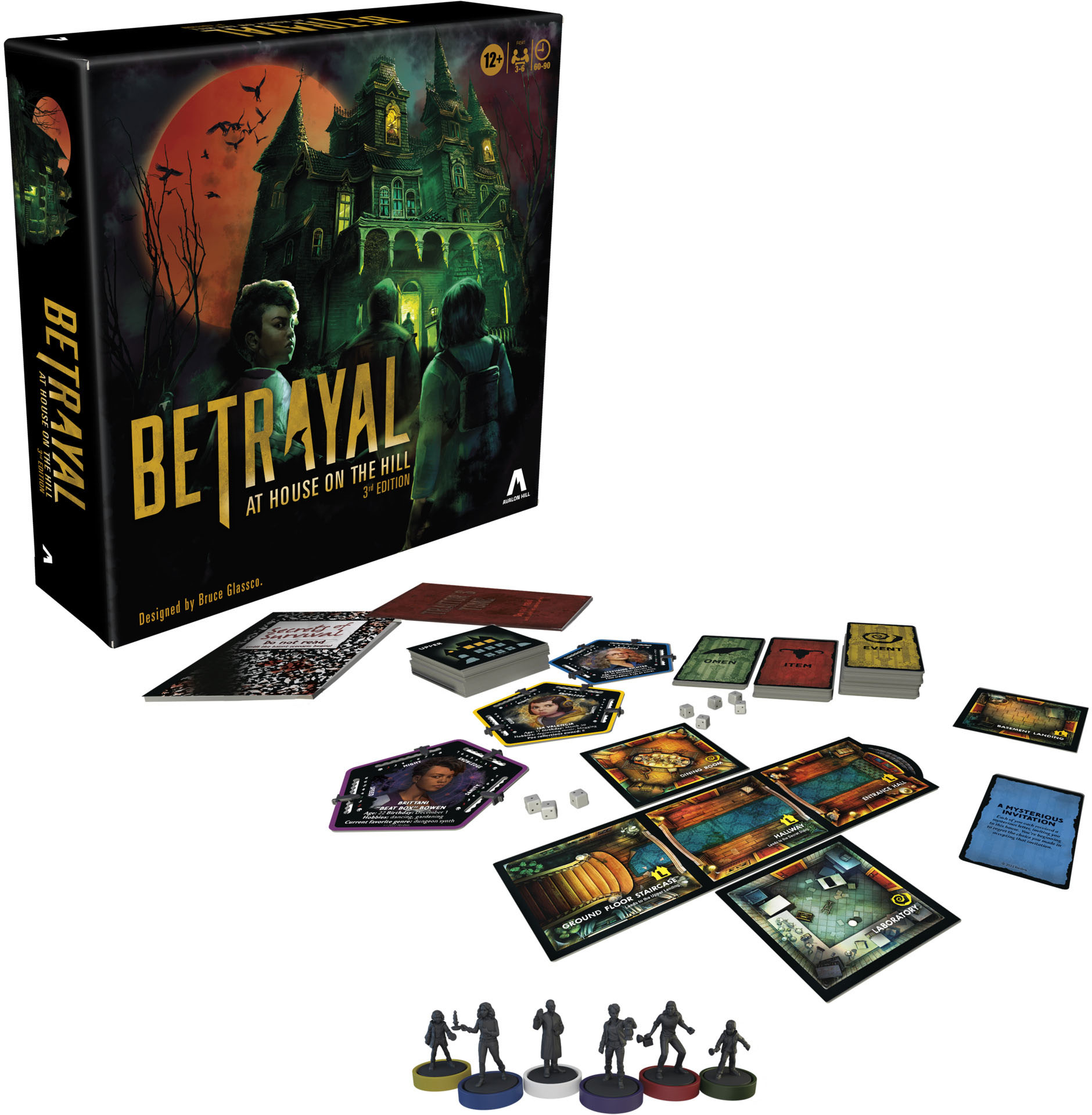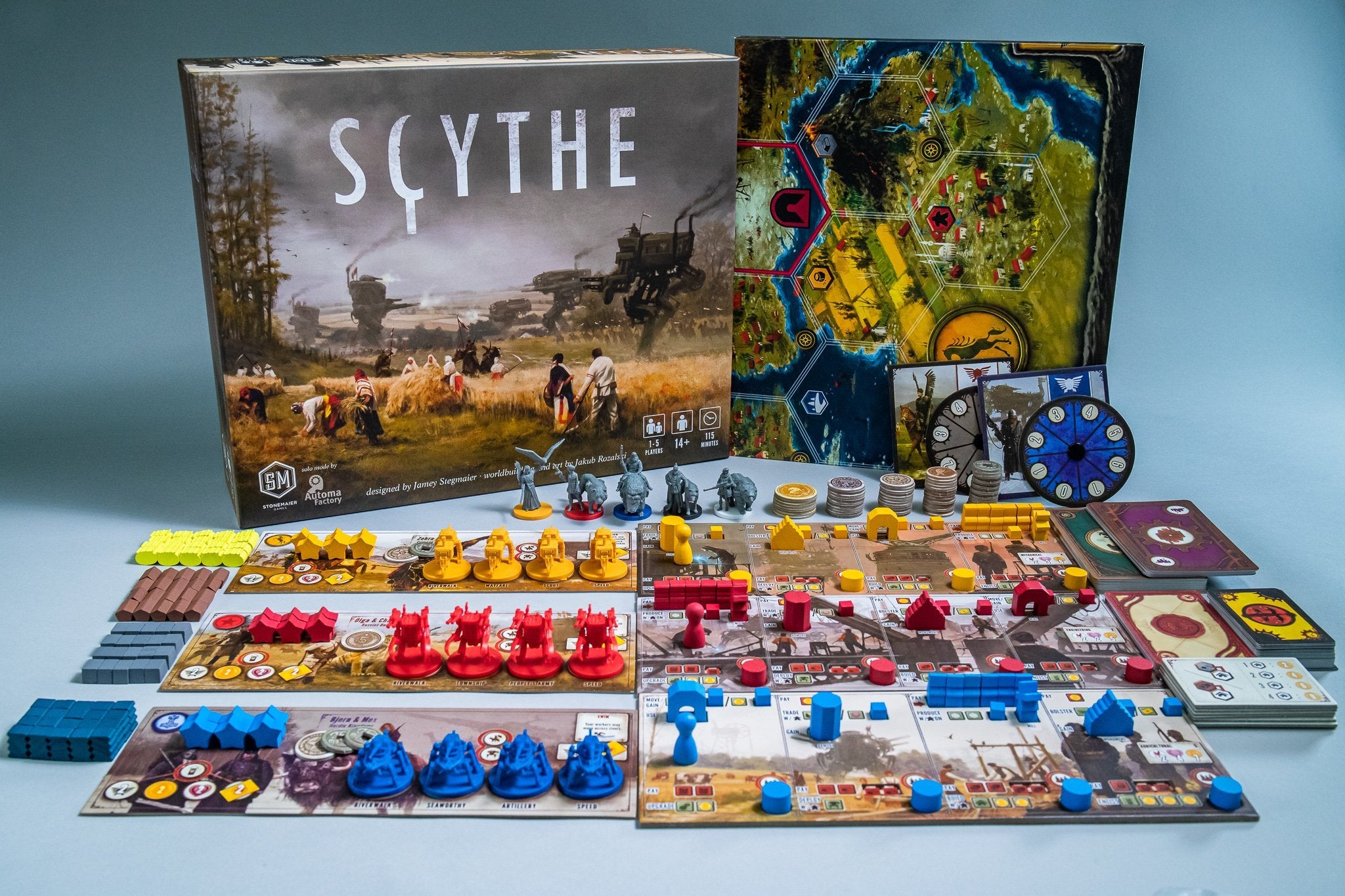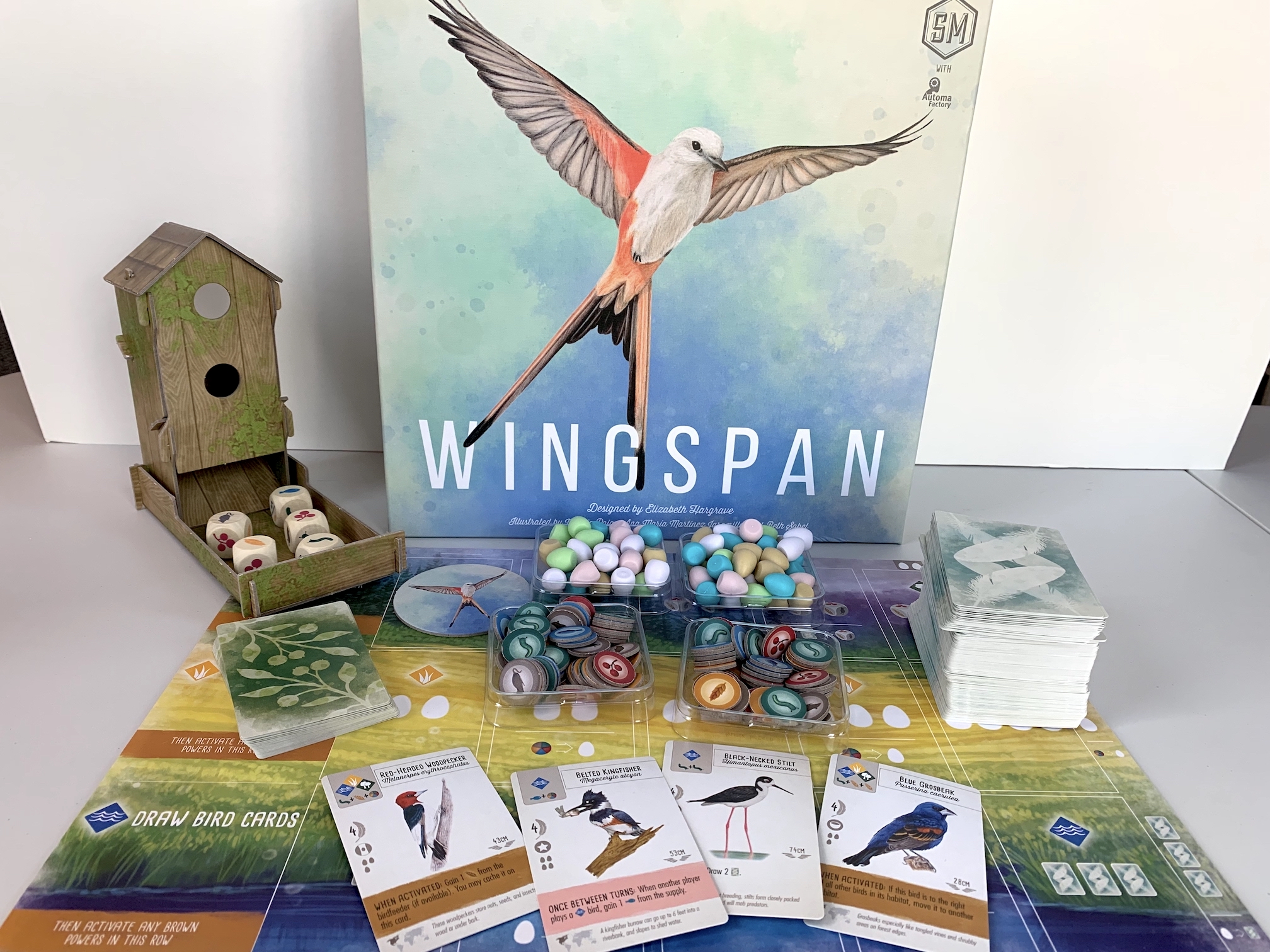
Despite the fact that board games have been around for hundreds of years (as we learned in my last post), hundreds of new ones are still released every year. The board game industry is very alive and well. In fact, it’s positively thriving with a market value of over thirteen billion dollars in 2023. Clearly, people like tabletop games. One thing that can be overwhelming, however, is the sheer amount of new games out there. How can you know what game is good when there are so many of them? One way is to give it a play run, which you can do at our Bored Gamer Night here at the library! Another way is to listen to recommendations. I can guarantee that all of the games on this list are so much fun to play and have fantastic themes to boot. They’re the type of games that really stick with you. If you love these games as much as I do, you’ll be sad when they end. Luckily for you, the corresponding book can extend the experience for days on end. Let’s start with one of my favorites:
My favorite cooperative game: Spirit Island
Spirit Island is one of my all-time favorite board games. If your friends are anything like mine, they absolutely completely switch personalities and become cutthroat the moment a competitive game is laid out. If you want to avoid the knowledge that your best friend is willing to betray you, try this anti-colonialist, asymmetric cooperative game. In Spirit Island, you play as nature spirits fighting to protect your island from white settlers. You work together with the other spirits and the native people to either destroy or scare away the invaders. One of my favorite things about this game is that each player gets to choose their own style of game. Some spirits focus on attacking, others on defense, fear, or movement of troops. Some of them are very complex, while others are relatively simple. If you’re like me and you play games with a group of people with wildly different tastes and abilities, this game is perfect.
It’s also perfect if you’re trying to view the world from a non-Eurocentric lens. If you want more of that, “Nation” by Terry Pratchett is the perfect read. Mau lives on a small tropical island and is about to enter manhood when disaster strikes. A devastating tsunami destroys everything in its path and leaves Mau alone with Daphne, a shipwrecked aristocratic English girl. The two of them have to overcome cultural differences, a language barrier and the effects of the natural world to protect their small band of refugees. I think a reviewer on bibliocommons summarizes it best when they say it is “…a good read for checking that white privilege.” This book has almost all of the markers of Spirit Island. There’s tropical islands, natural disasters, and English colonists to name just a few. The only difference is that the board game frames the colonists as the bad guys, whereas the natives and the colonists have to work together in “Nation.” That aside, this is sure to scratch the itch left by my favorite cooperative game. If you want something that has both cooperative and competitive elements, try…
Beginner’s first horror game: Betrayal at House on the Hill
For much of my life, I avoided horror like the plague. Anything that could possibly scare me was off the list. However, since listening to the Magnus Archives podcast (highly recommend, but do look at trigger warnings for each episode before listening cause it can get intense), I’ve discovered that if I watch my own emotions, horror can actually be really fantastic. This opens up a whole new world to me, including in board games. And where else to start but one of the most classic modern games, Betrayal at House on the Hill? In this tile-placing game, players explore a haunted house one room at a time. Everyone starts out as allies, navigating the ever-expanding house together as all try to avoid the dangerous traps and events. Eventually, however, exploration ends and the haunt begins. Suddenly, one player is revealed as the traitor. They work against their previous allies using various horror tropes like zombies, ghosts, etc., to achieve a particular goal. In general, this game is fantastic spooky fun.
If the concept of exploring a haunted house intrigues you, consider checking out “Delicious Monsters” by Liselle Sambury. This dual perspective narrative begins with Daisy moving into the home her late uncle left her and her mother. Hoping for a fresh start after the end of an abusive relationship, she quickly realizes something is very wrong with the seemingly perfect home. Ten years later, Brittney is determined to show that her emotionally abusive mother’s claim that the house “changed her for the better” is not true. She wants to expose the house as a place of horror in her investigative web show. Unfortunately. she may be digging into history that is best left buried. While the house acts almost like its own villain and the supernatural is abundant, they may find that the biggest villains are those closest to us.
The haunted house exploration in this book is perfect for Betrayal at House on the Hill. However, I will say that this book is a lot more intense than the game is. While the game has scary elements, this novel can be truly terrifying. Please be careful about reading it if any of the following themes or topics are upsetting to you: childhood sexual assault, childhood physical abuse, childhood neglect, gaslighting, grooming, suicide, animal death, maggots/bugs, fatphobia, body horror/gore, violence, and death. Like I said, it’s a very intense book. If you want something that still has a fantastic theme but isn’t laden with trigger warnings, check out:
One of the coolest alternate history games: Scythe
Sometimes I think we all need a quick break from our reality, and what provides more of a break than giant mechs? Scythe is set in the 1920s in an alternate history, where “The Factory”, a capitalist city-state in Eastern Europe, has now closed its doors. Players represent one of five factions who vie for control of the mech factory in the center of the map. Each faction begins with a different amount of resources, a unique starting location, and a secret goal. Everyone’s gameplay will look at least a little different as they build engines to increase production. There are innumerable ways to win, as very little is left up to chance. Using what’s at your disposal, you must try to gain territories, create villages, and build massive mechs in the quest to conquer all.
One of the things I like most about Scythe are the mechs. While the game is frankly incredibly expensive, Stonemaier did not skimp on the miniatures included. If you find the tiny little mechs as cool as I do, you would probably really like “Iron Widow” by Xiran Zhao. In this futuristic Chinese-inspired civilization, men and women are paired up to power gigantic mechs. Unfortunately, the society is incredibly misogynistic, and it’s considered fine to sacrifice women to power the machines. That is until Zetian Wu seeks revenge for the death of her sister. She quickly discovers that she has the ability to change the status quo by killing the men instead of the other way around. Suddenly, she must team up with two powerful men to force society to take women seriously. If you’re looking for something with a fantastic setting that’s full of female rage and queer representation, this is the book for you. Sometimes though, you don’t want to become super invested in a new world. Sometimes you just want to browse and learn some fun facts. If this is the case, consider looking into:
The most subtly fact-filled board game: Wingspan
If you’re even slightly into board games, you have probably heard of this hit engine-building game. In it, you try to attract birds to a series of wildlife preservations. Placing the birds in their particular habitat allows you to create increasingly complex engines to gain even more food and eggs. This, of course, allows you to find even more birds for your reserves. On top of the wonderful art and the very satisfying little eggs, one of my favorite parts of this game is the fact that every card has a fun fact on the bottom of it about that particular bird. I’m a bit of a bird enthusiast myself, and this game absolutely scratches that itch.
If you also love our feathered friends and want to learn more about them, “Birds” by the Britannica Illustrated Science Library is the place to go. This book is full of wonderful illustrations, graphs, photos, and facts about our avian companions. The diagrams inside are absolutely top-notch. They manage to take aspects of being avian that are hard to explain and par the information down into easily digestible chunks. If this one isn’t interesting to you, however, check out this book list by Tess with birding books for everyone from babies to teens. You’re bound to find one in her wonderful list that interests you!
If you really aren’t interested in nonfiction (honestly, same), you may like “Bianca Torre is Afraid of Everything” by Justine Winans. Bianca is an avid birdwatcher who is deathly afraid of, you guessed it, everything. Most of their life is lived indoors avoiding other people. Responsibility comes knocking, however, when they are the sole witness to their neighbor’s murder. When the death is ruled a suicide, they have to decide whether to stay away or investigate themselves. Enlisting the help of both their friend and their crush, they quickly realize that there is much more going on than what is seen on the surface. As someone with anxiety, I love Bianca’s journey to learning that they do not need to be defined by what scares them. I also love that we get to follow them as they figure out where they land on the gender spectrum as well. While only loosely connected to birding, this who-done-it novel is a must-read.
Regretfully, we have come to the end of books that remind me of board games. While there are many more I could discuss (Honorable mention to “Gold Mountain” by Betty G Yee’s connection to Ticket to Ride), we shall save those for another day. Gaming and books don’t have to vie for your attention. If you love a game, see if you can find a book that matches, and vice versa. Happy reading (and gaming) everyone!






